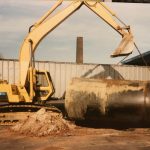3 Hazardous Waste Sources to Watch For on your Commercial Property
Owning a commercial property in New Jersey (NJ) is a lot of responsibility, as you are responsible for not only the welfare of the property but the welfare of the tenants. Hazardous materials can cause many health problems for tenants, and should be kept in check.
It should be obvious when there is a hazardous material problem in one of your buildings or properties, but sometimes they come from hidden sources that you may not have thought to look for in the first place.
If you need more information about the removal of hazardous waste or have any questions regarding what materials are hazardous and the implications, contact your local NJ hazardous waste removal company to speak to them about the process.
Where is this hazardous material coming from? While there can be many sources of hazardous material in commercial properties, there are three main places to monitor for hazardous waste leaks, all of which can be rectified in a variety of ways.
Underground Oil Tanks
Older properties often have underground oil tanks that are not being used. The material in the underground oil tanks can be hazardous if left leaking or if ruptured through a construction project or natural disaster.
Commercial properties sometimes need construction on the property to develop outdoor structures, parking lots or to put in outdoor pool systems. These often take a lot of construction, tearing up the ground and movement of heavy items back and forth across the property to accomplish.
The problem is that sometimes during this process, construction equipment can come into contact with the old oil tank, and cause leaks into the environment. If the tank itself it ruptured, owners are not only responsible for the cost to repair the leak, but also for the cleanup and preparation for damage to the environment. This is hazardous for the soil and water supply.
Above Ground Oil Tanks
Above ground oil tanks aren’t subject to construction leaks as easily as underground oil tanks are. However, they can become worn or often leak from exposure to natural disasters like hurricanes, wind storms or earth quakes.
In New Jersey (NJ), we are most subject to the harsh winds and rain of hurricanes that can further the rust process of the oil tanks. Winds and rain cause a problem for these oil tank – rust. The rust makes the structure more susceptible to breakage and damage possibly from natural causes or from animals and other sources that may be damaging to the tank.
Removing your oil tank from your commercial property can ensure there will be no problems with leakage into the environment. Filling the oil tank with cement can also help this process, but removing the tank is the best solution to the problem.
Underground Piping to Oil Tanks on Commercial Properties.
Older properties will have piping that leads to the building or structures on the property to get the most use out of the oil tank. If there is leakage into the piping, or if the piping itself is cracked, hazardous materials can leak from the piping into the environment, causing problems for the soil around you and also environmental problems for tenants or visitors.
Removing the underground piping and the oil tank structure itself is the best way to ensure that there is no hazardous waste exposure to your commercial NJ property.
T Slack Environmental Services is a certified NJ oil tank removal company that can assist you oil tank removal on you commercial properties. For more information on how we can assist you in your audit process, contact us.




